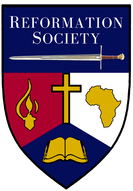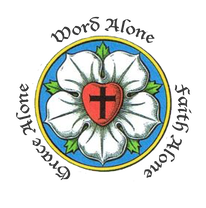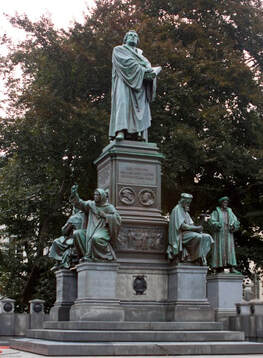 Our articles, How the Reformation Changed the World and Here I Stand received many responses from around the world, mostly very positive. However, there were also some friends who responded in surprise that we could have so positively quoted from Martin Luther, because from what they had heard, he was anti-Semitic and responsible for terrible atrocities against the Jews. Character Assassination I was even directed towards websites that are dedicated to depicting Luther as an "anti-Semite" who "laid the foundations for the holocaust!" Luther Was Friend and Advocate for Jews The accusation that Martin Luther was an anti-Semite, responsible for massacres, reveals an ignorance of history. Luther was pro-Christ and he was zealous in evangelism. For decades he lovingly and patiently reached out to the Jewish people in his arewith the Gospel. In 1523, Luther accused Catholics of being unfair to Jews in treating them "as if they were dogs". Luther was outraged and declared that such mistreatment made it even more difficult for Jews to convert to Christ.
0 Comments
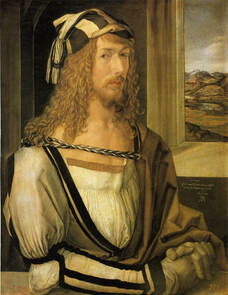 Albrecht Dürer was the oldest son and third of 18 children born to a goldsmith in Nuremberg, Germany. His father, Albrecht Dürer, the elder, worked hard in his precious metals business, but faced severe trials and suffered the loss of many of his children. Only three of his 18 children survived to adulthood. Yet Mr. Dürer was an honest man who trusted in God and handled his trials with courage and faith. His son, Albrecht wrote: “My father lived an honorable Christian life. He was a man patient of spirit, mild and peaceable to all, and very thankful toward God… He was a man of few words and a God fearing man… This man, my dear father, was very careful of his children to bring them up to love and honour God.” 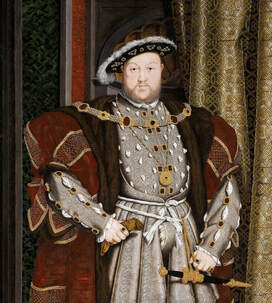
In 1513, 22 year old King Henry VIII waged a crusade in Europe on behalf of Pope Julius II, who had promised Henry recognition as a “most Christian King” if he would “utterly exterminate the King of France.” In 1521, Henry authored a book, “The Seven Sacraments” attacking Martin Luther and defending Catholicism’s view of the Sacraments. For this, the Pope gave Henry the title “Defender of The Faith.”
Henry was a Renaissance man, he was fluent in Latin, French and Spanish, an accomplished musician, theologian and Humanist scholar. Yet, despite Henry’s strong loyalties to the Pope, expressed in both blood and ink, Henry did much to open England to the Reformation. It was not so much that Henry embraced the Protestant faith, as much as he came to reject the authority of the Pope over English affairs. Henry was determined to have a male heir to the throne, to protect England from going through the kind of devastating civil war that his father had come to power through (The War of the Roses). Henry ended up going through 6 wives, 2 of whom lost their heads as a result of losing his favour. 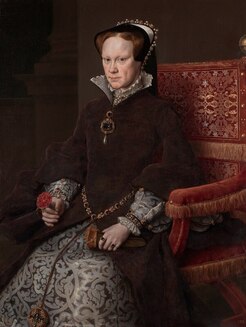 Queen Mary is remembered as the ruler who failed to return England to the Catholic Church. As Foxe’s of Martyrs (Acts and Monuments) recorded, not the hundreds of prominent executions carried out under Blood Mary, nor the cruelties, torment, torture and oppression were sufficient to crush the Protestant Reformation in England. In fact, the end result of Mary’s attempts to return England to Catholicism were rather to convince the vast majority of Englishmen in their resolution and determination never to again succumb to such tyranny, superstition, intolerance or error ever again. By trying to exterminate the Reformation, Bloody Mary only succeeded in entrenching it. Several people have challenged us over organising Reformation Conferences and claimed that the Reformers persecuted the Anabaptists just because they “were not willing to baptise babies.” One correspondent wrote that rather than celebrate the Reformation “would it not be preferable to study the Scriptures…” Back to the Bible Here is our response: Of course, our highest priority is to “study the Scriptures daily to see if these things be true”. In fact that is the heritage of the Reformation. The Reformation gave us back the Bible freely available, translated into our own languages, and the Reformers championed “Scripture alone is our final authority”. The Reformation succeeded in bringing about greater freedoms than had ever been experienced before in human history. 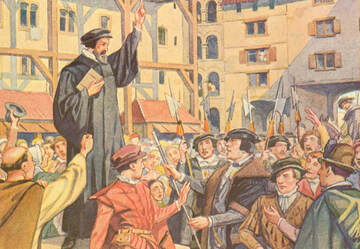
A Man of Action
Guillaume Farel (1489-1565) was a dynamic man of action who gave his whole life to spreading the Gospel of Christ. Farel was one of the most important leaders of the French Reformation from its beginnings. By Grace Alone While studying under Professor Jacques Lefevre at Sorbonne University in Paris, Farel came to faith in Christ. Professor Lefevre had published a Latin translation of, and commentary on, The Epistles of St. Paul. As he taught that it is God who saves by grace alone, Farel said his eyes were opened and his heart believed. Leader of the French Reformation When Luther’s Reformation writings came to France, Farel was one of the most prominent leaders in the French Reformed movement. When persecution forced him to flee from France in 1523, he became the leader of a group of evangelists who preached in French speaking Switzerland. 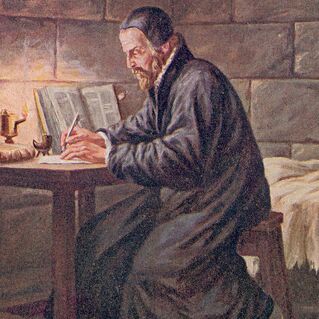
Bishop Stephen Bradley observed: “We are in danger of forgetting truths for which previous generations gave their lives.”
That our churches are in danger of forgetting the great Reformation truths, for which previous generations of martyrs willingly laid down their lives, was forcefully impressed upon me during a recent ministry trip to Europe. I had the opportunity to visit Oxford and see the Martyrs Memorial. It drew my attention to an event that occurred 450 years before. The Oxford Martyrs On 16 October 1555, just outside the walls of Balliol College, Oxford, a stout stake had been driven into the ground with faggots of firewood piled high at its base. Two men were led out and fastened to the stake by a single chain bound around both their waists. The older man was Hugh Latimer, the Bishop of Worcester, one of the most powerful preachers of his day, and the other Nicolas Ridley, the Bishop of London, respected as one of the finest theologians in England. More wood was carried and piled up around their feet. Then it was set alight. As the wood kindled and the flames began to rise, Bishop Latimer encouraged his companion: “Be of good cheer, Master Ridley, and play the man! We shall this day light such a candle, by God’s grace, in England, as I trust shall never be put out.” 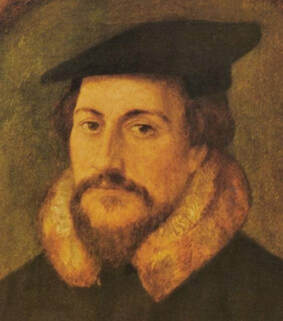
To read the Dutch translation of this article, click here.
The exiled French Reformer, John Calvin, became the most influential man of his age and his teachings have proven to be some of the most influential in the shaping of Great Britain and the United States of America. Prominent Calvinists Some of the greatest philosophers, writers, Reformers and Christian leaders in history have described themselves as Calvinists. Some of Calvin’s influential disciples include: John Knox, William the Silent, Oliver Cromwell, John Owen, John Milton, Richard Baxter, Jonathan Edwards, David Brainerd, George Whitefield, William Carey, William Wilberforce, Sir Isaac Newton, Lord Shaftesbury, Charles Spurgeon, David Livingstone, The Covenanters in Scotland, The Huguenots of France, and the Pilgrim Fathers who emigrated to New England. 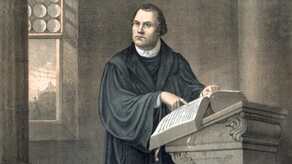
Reformation Day Events
To see upcoming Reformation Day Celebration events, click here. You can also view upcoming events on Reformation 500 Facebook page, please like and share on social media. For more details, phone: 021-689-4480, or e-mail [email protected] “But seek first the Kingdom of God and His righteousness and all these things shall be added to you.” Matthew 6:33 31 October 1517 marks a single event, on a single day, which changed the world forever. It marks when Professor Martin Luther nailed his 95 Theses on the door of the Schlosskirche (The Castle Church) in Wittenberg, Germany. First Things First It was not that Martin Luther was attempting to launch a Reformation. He was seeking first the Kingdom of God and His righteousness. It was Martin Luther’s desperate quest for peace with God that led him to study the Scriptures intently. He was overwhelmed by the holiness of God and the depravity of man. He agonised over his own sinful nature. 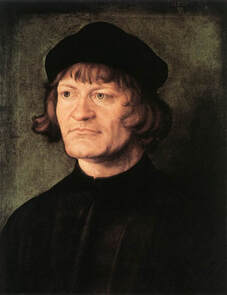
1 January marks the birthday of Swiss Reformer Ulrich Zwingli and of the launch of the Reformation in Switzerland. It was on 1 January 1519 that Ulrich Zwingli began expositionary preaching in Zürich, starting with the Gospel of Matthew, Chapter 1. Ulrich Zwingli was the father of the Reformation in Switzerland.
Born and raised in the Alps, Zwingli was one of the most colourful and audacious characters in Swiss history. A devout student of Scripture, Zwingli was transformed and shaped by the Word of God. He has been described as "an amazing combination of intellect, passion and wit." Man of the Mountains Born at an altitude of 3,600 feet (1,100 metres), the son of the Mayor of Wildhaus, Zwingli studied in Bern, Basel, and Vienna. In 1506, he received his MA degree. As a pastor in Glarus, Zwingli served as a chaplain with Swiss mercenary soldiers in Italy. The Swiss regularly hired out their men to fight for foreign powers. At that time, the Swiss generally believed that their national economy depended on this war industry. |
History ArticlesCategories
All
Archives
May 2023
|
- Home
-
History Articles
- History Articles
- All Categories
- Character Studies
- Greatest Century of Missions
- Greatest Century of Reformation
- Reformation In Bohemia
- Reformation In England
- Reformation In France
- Reformation In Geneva
- Reformation In Germany
- Reformation In Italy
- Reformation In Scotland
- Reformation in Switzerland
- Victorious Christians
- Contemporary Articles
- Resources
- Contact
- Donate
|
The Reformation Society
PO Box 74, Newlands, 7725, South Africa Tel : (021) 689-4480 Email: [email protected] Copyright © 2022 ReformationSA.org. All rights reserved |
- Home
-
History Articles
- History Articles
- All Categories
- Character Studies
- Greatest Century of Missions
- Greatest Century of Reformation
- Reformation In Bohemia
- Reformation In England
- Reformation In France
- Reformation In Geneva
- Reformation In Germany
- Reformation In Italy
- Reformation In Scotland
- Reformation in Switzerland
- Victorious Christians
- Contemporary Articles
- Resources
- Contact
- Donate
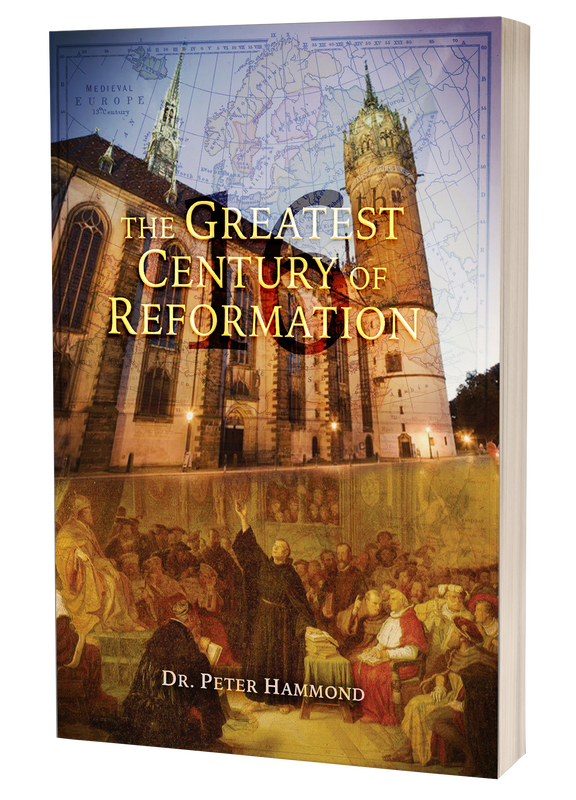
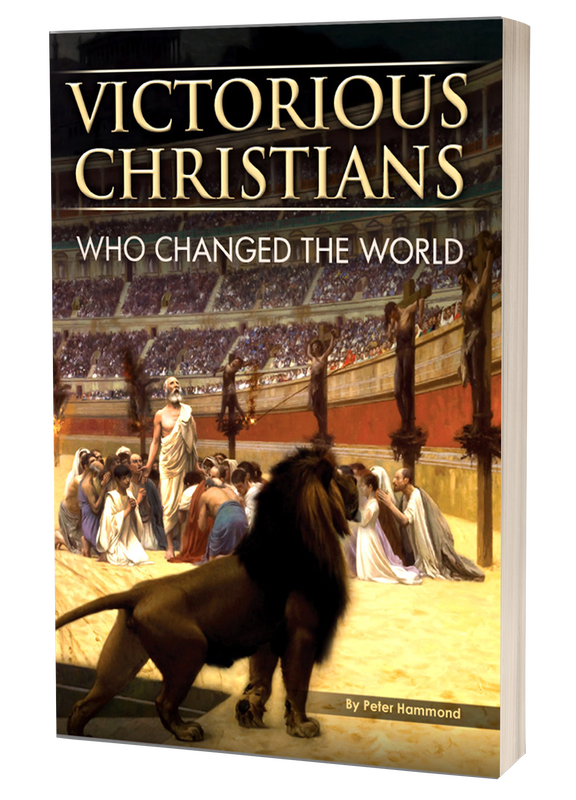
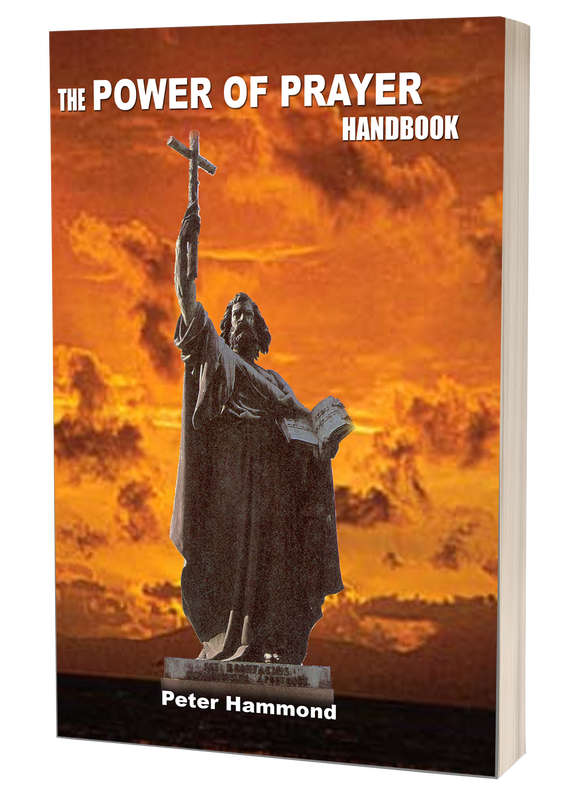
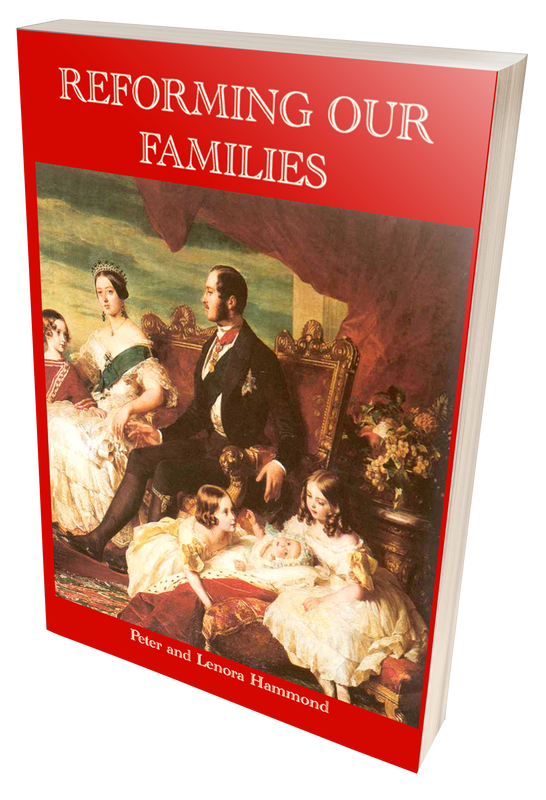
 RSS Feed
RSS Feed
